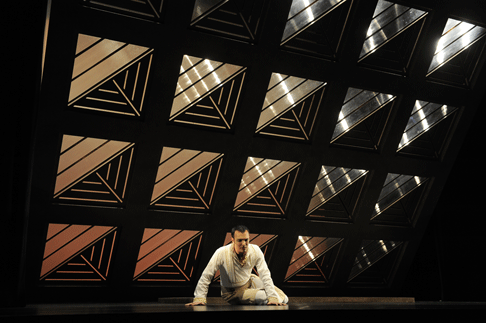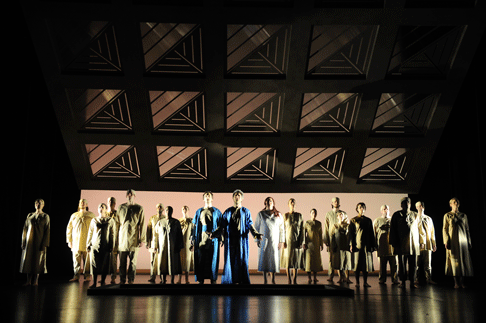For the first opera during its Spring 2010 season Chicago
Opera Theater staged a production based on the new critical edition of
MosË by Charles S. and Patricia B. Brauner. As Philip M. Gossett
indicates in his notes accompanying the program for this production, the
Italian MosË, originally performed in Naples, “is a work of
great value” which “contains some of Rossini’s finest
music.” The present production, with strong vocal contributions from a
convincing cast, gave ample support to these statements.
Under the direction of Leonardo Vordoni the brief orchestral prelude set a
tone both stately and somber, in which the distraught court of the Pharaoh and
the plight of Moses and his people are alternately depicted. Darkness has
fallen over the land, and Faraone determines to free the camp of Moses in order
to release Egypt from such a plague. When he sends for Moses and makes known
his intention, the captive leader calls out to God and, with the gesture of his
staff, causes light to return to the land. The two opposing leaders were sung
by bass-baritone Tom Corbell as Faraone and bass Andrea Concetti as MosË. Mr.
Corbell showed admirable facility in his delivery of rapid notes whereas Mr.
Concetti struck an imposing figure with declamatory weight in his delivery of
MosË’s opening lines. In the ensemble showing varied reactions to this
change, brought about by MosË, Faraone and his consort Amaltea are joined by
the Egyptian heir and Prince Osiride along with Aronne, the compatriot of MosË.
Faraone declares that the Hebrews will, in return for this gesture, be set free
and Amaltea supports the decision. Corbell as Faraone was joined in his florid
statement with the equally challenging line composed for Amaltea, here sung
admirably by Kathryn Leemhuis, a member of the Ryan Opera Center at Lyric Opera
of Chicago. Leemhuis gave a strong individual impression in her careful
decoration yet blended with the others to yield a memorable and dramatic
ensemble. The final lead member featured in this group was the Osiride of
Taylor Stayton. Mr. Stayton shows great promise as a tenor able to project with
dramatic lyricism the challenging dramatic line featured in this and comparable
pieces by Rossini. Here Osiride expresses his disagreement concerning the
release of the Hebrews, since his secret beloved Elcia is one of the people of
MosË, now scheduled to depart in freedom.
After the others leave, Osiride plots with the high priest Mambre and
suggests that the latter use his powers to sow discord once again between MosË
and Faraone. Elcia now joins her lover Osiride in order to bid farewell as she
expects to leave Egypt with MosË. In their moving duet Si‚n Davies sang the
part of Elcia with great urgency and proved to be an appropriate match for Mr.
Stayton’s compelling depiction of the Egyptian prince. Upon the exciting
conclusion to their duet, Amaltea appears and chides Mambre for his attempts to
dissuade Faraone from releasing the Hebrews. Her words go unheeded, for
Osiride’s plan has succeeded, Faraone declares his decision revoked, and
the Hebrews feel themselves betrayed. At the close of the act MosË invites
further storms to fall upon the land of Egypt.
 Taylor Stayton as Osiride
Taylor Stayton as Osiride
After an intermission, Acts II and III were performed without pause in this
production by Chicago Opera Theater. Attempts to resolve the imprisonment of
the Hebrews are fueled by Amaltea’s independent negotiations with MosË.
At the same time Faraone resolves to marry off Osiride to an Armenian princess
and to proclaim him co-ruler of Egypt. The dismay of Osiride was expressed in
Stayton’s fervent delivery, in which he maintained hopes still to retain
Elcia’s love. When the latter enters among the imprisoned Hebrews, she
advised Osiride to seek an equivalent love in his official betrothed. Ms.
Davies’ moving expressiveness and exquisitely secure pitch in this aria
remained one of the highlights of the performance. Osiride then threatens
violence to MosË but he is, instead, struck dead by a lightning bolt; as the
act concludes, both Faraone and Elcia mourn his loss.
 Jorge Prego as Aronne, Andrea Concetti as Moses and Si‚n Davies as Elcia with the Israelites
Jorge Prego as Aronne, Andrea Concetti as Moses and Si‚n Davies as Elcia with the Israelites
In the brief Act III on the banks of the Red Sea the famous prayer delivered
by MosË calms his people, who fear that they will be sacrificed to the anger of
Faraone’s troops. Elcia is encouraged to continue her journey with the
other Hebrews. In this Mr. Concetti as MosË delivered a fervent declamation in
the concluding piece of the opera. The Red Sea parts and his people cross, just
as Faraone and the high priest are swallowed up as they attempt to pursue. The
dramatic moment received an appropriately conclusive orchestral flourish.
Salvatore Calomino
image=http://www.operatoday.com/Moses_COT_Photo-3.gif
image_description=Andrea Concetti as Moses [Photo by Liz Lauren courtesy of Chicago Opera Theater]
product=yes
product_title=
product_by=Moses: Andrea Concetti; Faraone: Tom Corbeil; Elcia: Si‚n Davies; Amaltea: Kathryn Leemhuis; Mambre: Samuel Levine; Aronne: Jorge Prego; Amenofi: Emily Grace Righter; Osiride: Taylor Stayton. Conductor: Leonardo Vordoni. Director: Andrew Eggert. Production Designer: Anka Lupes. Lighting Designer: Keith Parham. Chicago Opera Theater.
product_id=Above: Andrea Concetti as Moses
All photos by Liz Lauren courtesy of Chicago Opera Theater